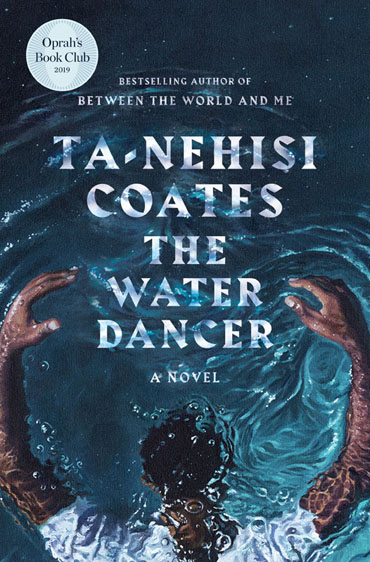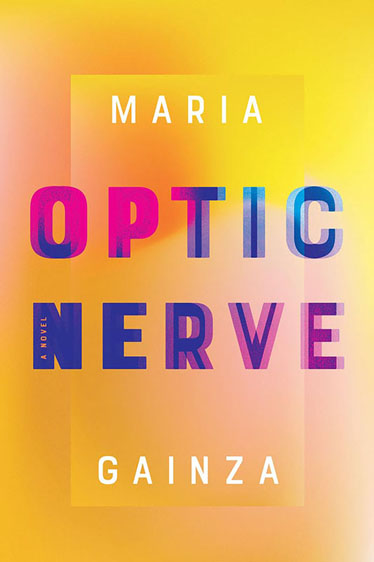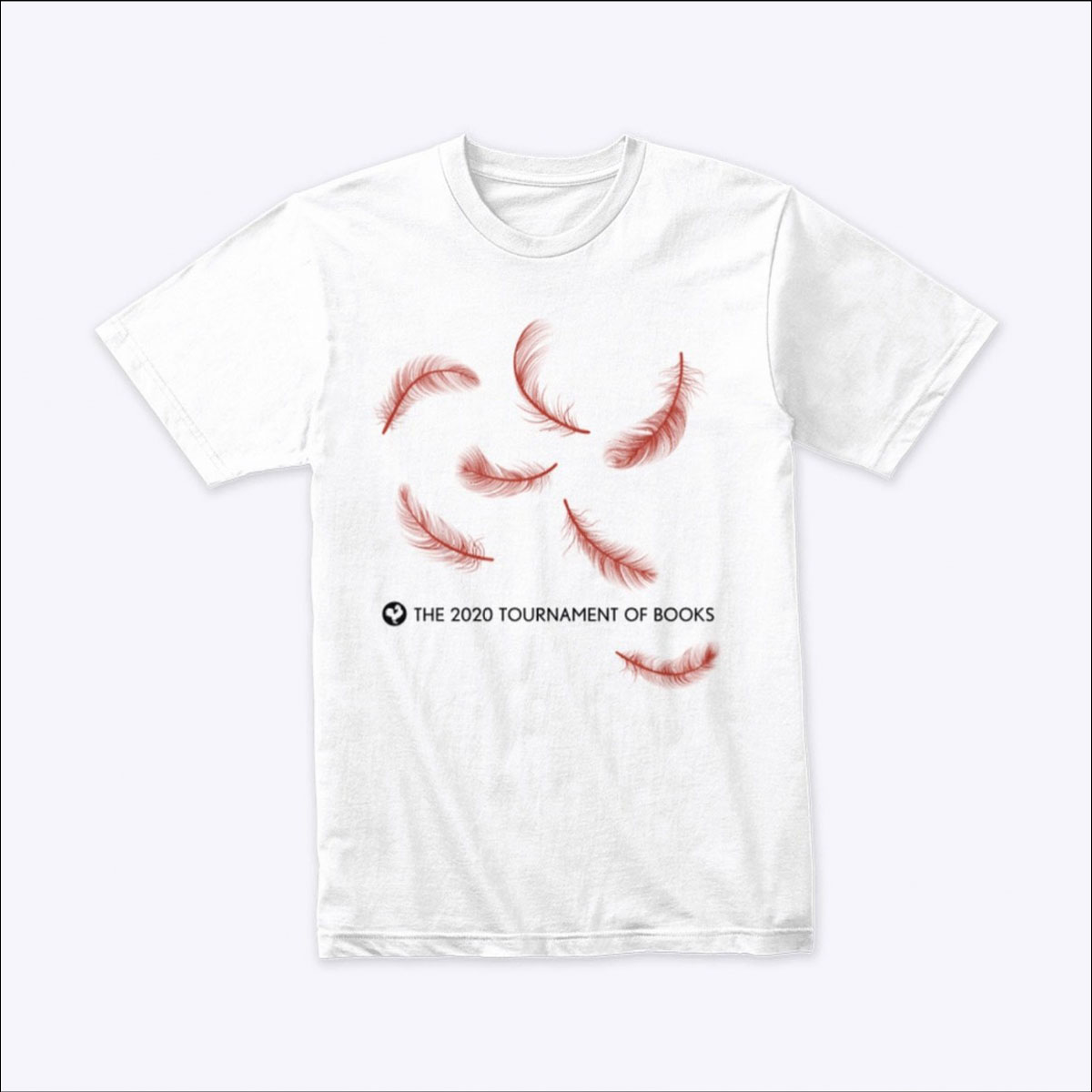-
March 13, 2020
Opening Round
-
Ta-Nehisi Coates
1The Water Dancer
v.
4Optic NerveMaría Gainza
-
Judged by
Debbie Millman
I had never read—or even heard of—the Tournament of Books before being asked to judge in the opening round of this year’s Tournament. I was recommended as a judge by someone important to me, someone I try to say yes to, no matter what. It would be fair to say it was a foregone conclusion that I would say yes when I got the invitation. I did this happily and without any sense of trepidation or anxiety. After all, I am a writer. I’ve authored six books and written for three blogs. This was a no-brainer. I could do this! Then I went to look at the Tournament of Books.
Yikes.
With only a quick and rudimentary perusal, I quickly understood that the ToB is a big deal. It was actually a way, way, way bigger deal than I realized. Jami Attenberg was a judge. Celeste Ng was a judge. Meg Wolitzer was a judge. Major books were judged: books by Toni Morrison and Donna Tartt and Cormac McCarthy. These were real books. They were judged by significant writers. My books are books but they are not real books. I am a writer, but I am not a significant writer. I’ve written design books and business books and not one has ever gotten close to hitting the bestseller list. (At least not yet.)
I was hopeful the bosses at ToB would recognize my limitations and send me some fun, no-pressure reading. After all, I was first round! Time to get the slackers out of the way!
If only.
Apparently, there are no no-pressure books in ToB. I was sent the long-anticipated debut novel The Water Dancer by National Book award winner and MacArthur Fellow Ta-Nehisi Coates. This novel debuted at no. 1 on the New York Times bestseller list. Then I received Optic Nerve by the Argentinean art critic, editor, and writer María Gainza. This book is Gainza’s English-language debut and has already been published in 10 languages.
I was doomed.
I started The Water Dancer first. I was a big fan of Ta-Nehisi Coates’s essays in the Atlantic. Given the critical acclaim of his previous books, his daunting pile of accolades and awards, and the fact that Oprah called The Water Dancer one of the best books she’s read in her entire life, I was beside myself with anticipation and excitement. I was only a little afraid.
The Water Dancer is set in pre-Civil War Virginia and is the story of Hiram Walker, the son of an enslaved woman sold and sent away many years earlier, and the white plantation owner who sold her. Early on in the book, Hiram realizes he is able to teleport over long distances via a type of water conduction. This conduction seems to be controlled by memory, but with lapses in his own memory—particularly regarding his long-lost mother—Hiram can’t control or leverage his unique power. Ultimately Hiram has to learn to access the early memories he has of his mother in order to be able to activate the energy which can ignite his conduction powers. Along the way, he meets and is taught by Harriet Tubman, who also possesses the power of conduction. She teaches him how to control and manage his power while helping free slaves via the Underground Railroad.
Alas, while it might have been for Oprah, this was not one of the best books I’ve read in my entire life. Not by a long shot. The Water Dancer is ornately dense and murky. It is so dense and murky I often didn’t know what it was supposed to be about. Now, to be clear, I’m all for dualities and multiple realities, as long as it’s deliberate but The Water Dancer is as confounding as it is confusing: Is it a book about slavery and freedom? Is it a book about race and class? Is it about love and loyalty? Is it about magic and memory? Is it about time travel? The Water Dancer could be described as all of the above or none, and that ambiguity does not feel deliberate or resolved at all. It’s just…messy.
The Water Dancer is not all bad; it has moments of sheer exhilaration and thundering suspense. But the book did not live up to my significant expectations.
María Gainza’s Optic Nerve is also a book of dualities, but these dualities are handled with intention. Where The Water Dancer is disorganized and untidy, Optic Nerve is steely and spare. Both novels deal with memory and loss, but while The Water Dancer is clunky, Optic Nerve is sly. The author states the following early in the book, about the senseless, almost farcical death of an old friend:
I cannot tell what I should do with a death as ridiculous as hers, as pointless and hypnotic, nor do I know why I mention it now, though I suppose it’s always probably the way: you write one thing in order to talk about something else.
Optic Nerve is a novel that describes one thing in order to describe something else, in doing so, the author generously allows us to read one thing and consider everything else. These are moments of true magnificence in this book.
Optic Nerve is a work of autofiction, a form of fictionalized autobiography. In Optic Nerve, María Gainza is a prominent art critic, narrator Maria is as well. Gainza admitted to LitHub that her own life story provides “just a drop of color” to the novel and a good chunk of Optic Nerve reads like art criticism. What is art criticism doing in a work of fiction? Is it the objective criticism of a genuine art critic, or the subjective musings of a character thinking about art? Or both? Whereas I was unsure about Coates’s intention, Maria the author and Maria the narrator appear to be careful co-conspirators in the best possible way: The novel strategically teases and taunts with reality and time. She jabs back and forth between the narrator’s fear of flying and Henri Rousseau’s yesteryear paintings of airplanes. She juxtaposes the story of a surly Mark Rothko and his unfinished paintings for the Four Seasons restaurant with a visit to her doctor and worries about her own unfinished life and ambition.
Optic Nerve is a deeply psychological little gem of a novel about one woman’s life and how her observations about art reveal her utterly human heart. Optic Nerve does not have to be read in a linear manner, each chapter is a story unto itself. There is no definitive plot, there is only connective tissue composed of musings. But read as a whole (and in any order), the novel deftly investigates the mystery and magic between objectivity and awareness, consciousness and deceit, and offers a glimpse into the profound way art allows us to see what we are afraid of and why. It is this nuanced complexity and the beauty with which it is rendered that elevates Optic Nerve and makes it the clear winner. With her debut, Gainza establishes herself as the significant writer so many of us hope to be.
Match Commentary
By Kevin Guilfoile & John Warner
John Warner: This feels like a big upset to me, but that’s the Tournament of Books for you.
Kevin Guilfoile: Somebody give Max Planck the bad news, John: Chaos is the only constant.
I’m not an art expert, but I’m interested in art, meaning I took a bunch of art history classes in college. On our anniversary, my wife and I usually buy a piece of original art (more often of the outsider variety than the fine). For three summers in the ‘80s I was a domestic worker for Stephen Clark, Jr., whose family once owned one of the greatest collections of impressionist and modernist paintings in the world. Sometimes their name would come up in a class and I would nudge the student next to me and whisper, “I clean that guy’s pool!” after which that student would usually move seats.
Once I was driving my boss and a trunk full of liquor to Saratoga for the thoroughbred racing season and we stopped at Burger King for lunch. In an attempt at small talk, I mentioned to Mr. Clark that the previous semester I had studied a famous Van Gogh that his family had once owned, and which they had donated to Yale University.
Mr. Clark squinted at me. “Van Gogh…” he said. “Which one?”
“Le Café de Nuit,” I said. “The Night Café.”
Mr. Clark took a few extra chews of his Whopper. “Huh. What did it look like?”
These are all my art bona fides. If you want to put a measure on it, I am demonstrably more interested in art than the son of perhaps the greatest American art collector of the 20th century.
So when I opened up Optic Nerve I felt like I should have been on board with the program. I like reading about art. Optic Nerve finds a way to turn discussions of art into something intensely personal, and even profound. You and I both received our public initiations as writers at McSweeney’s, which was at one time a clearing house for a kind of writing that’s about one thing on the surface but really about some other thing. And so I read Optic Nerve. And…I liked it fine.
But here’s the thing, and I touched on this in our discussion of Saudade. Would I, at this stage in my life, rather read a novel like Optic Nerve or a novel like The Water Dancer? The answer is The Water Dancer. By a lot. Part of this—maybe all of it—is me getting older, for sure. But I have to say, this wasn’t always the case and it isn’t something I specifically knew about myself until I was forced by this exercise to ask myself that question. I would never argue that Judge Millman is wrong and that Optic Nerve is undeserving. But given how much I felt like this would be a fair fight in my mind (and it probably would have been for an earlier version of me) I was surprised at what an easy decision this would have been for me had I been wearing the judicial robes.
John: Though it is brief and I’ve owned the book for months, I’m still reading Optic Nerve, which I enjoy reasonably well while I’m reading it, but then never feel super-compelled to pick it up once I put it down until I remind myself that I’m supposed to be reading it for the ToB, so I start reading it again, rinse, and repeat.
As a reader, I am hit and miss with the autofiction movement. If the voice manages to get its hooks into me, and I join that consciousness, I’m as gripped as if it was a thriller. But, as often as not, I’ll pick up the latest example and never find purchase. I don’t have a clear theory as to what hits and what misses. My best guess is that it depends on where I’m at when I pick the book up, rather than anything having to do with the book.
That Optic Nerve is moving on means I’ll likely keep pecking away at it, but it’s not like I feel utterly compelled to do so.
Kevin: Judge Millman is transparent about her apprehension when cracking The Water Dancer. I felt that, too. Ta-Nehisi Coates is one of the finest persuasive writers of our time. In a world in which the greatest motivator seems to be confirmation bias, Coates has an extraordinary ability to make stubborn readers, myself included, admit, “You know, I actually hadn’t thought of that.” Multiple people have cited his famous Atlantic essay on reparations to me as one that had entirely changed their mind on the subject. Do you know how many other essays have been cited by multiple people to me in the last decade, John? None probably.
I was excited to discover how those skills translated to fiction, and I was delighted to find the answer was pretty damn good.
John: It is pretty damn good. Really really good, and yet…I think there are some craft/structural issues that kept me from an overwhelming embrace. My biggest issue is how much story happens off screen and is recounted later. I won’t name specifics to avoid spoilers, but there’s a few times where the tension of anticipation is deflated without any resulting narrative payoff.
The first-person retrospective POV hems things in a bit, so where something happens without Hiram’s presence, there’s not a lot that can be done, though for an example of a novel that maneuvers through this problem with great brio, look no further than last year’s Washington Black.
That said, this was not a close contest for me. Between you and me, old friend, I don’t finish the majority of new books that I start. Professional obligations need to keep me moving toward the stuff that floats my boat so I can in turn recommend those books to others. The Water Dancer kept me invested and involved throughout. I read it in a couple of days, which for me is a sign of quality.
Kevin: As you point out, the book’s narrative instincts sometimes led to decisions that put a little too much burden on the reader (“disorganized and untidy” is how Judge Millman put it), and I didn’t always feel the story pulling me forward. But writing novels is hard and I will always cut a first novel some slack, even if the author of it has previously proven himself a brilliant writer of nonfiction. I thought the world building was really quite good, and the place description excellent. We read historical fiction (even, or maybe especially, historical fiction with something of a magical-realist bent) to be transported to an unfamiliar time and place and I “believed the book,” which is more than half the trick. I would have advanced The Water Dancer, as well.
On Monday, the booth will be occupied by TMN’s Rosecrans Baldwin in conversation with Rooster fan Ron Block as Ocean Vuong’s On Earth We’re Briefly Gorgeous takes on Steph Cha’s Your House Will Pay.
New 2020 Tournament of Books merch is now available at the TMN Store. As a reminder, Sustaining Members receive 50 percent off everything in our store. To find out why we’re asking for your support and how you can become a Sustaining Member, please visit our Membership page. Thank you.
Welcome to the Commentariat
Population: You
To keep our comments section as inclusive as possible for the book-loving public, please follow the guidelines below. We reserve the right to delete inappropriate or abusive comments, such as ad hominem attacks. We ban users who repeatedly post inappropriate comments.
- Criticize ideas, not people. Divisiveness can be a result of debates over things we truly care about; err on the side of being generous. Let’s talk and debate and gnash our book-chewing teeth with love and respect for the Rooster community, judges, authors, commentators, and commenters alike.
- If you’re uninterested in a line of discussion from an individual user, you can privately block them within Disqus to hide their comments (though they’ll still see your posts).
- While it’s not required, you can use the Disqus
tag to hide book details that may spoil the reading experience for others, e.g., “ Dumbledore dies .” - We all feel passionately about fiction, but “you’re an idiot if you loved/hated this book that I hated/loved” isn't an argument—it’s just rude. Take a breath.



